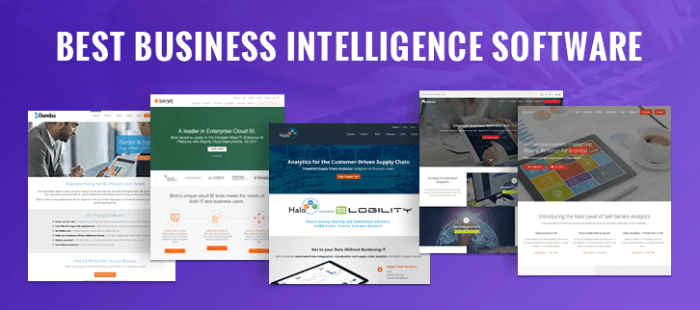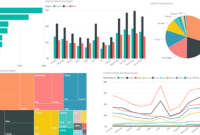Business intelligence software is a powerful tool that enables companies to harness data for strategic decision-making, driving success and growth in the competitive market landscape. From analyzing trends to predicting outcomes, this innovative technology revolutionizes the way businesses operate.
With a plethora of features and benefits, businesses can unlock the true potential of their data, gaining a competitive edge and staying ahead of the curve. Dive into the world of business intelligence software and discover how it can transform your organization today.
Introduction to Business Intelligence Software

Business Intelligence Software is a technology-driven process for analyzing data and presenting actionable information to help executives, managers, and other corporate end-users make informed business decisions. It involves the use of software applications to collect, integrate, analyze, and present business data in a visually appealing format.
Utilizing business intelligence software is crucial for companies to gain valuable insights from their data, identify trends, patterns, and anomalies, and make data-driven decisions. By leveraging BI software, organizations can optimize operations, improve efficiency, enhance customer satisfaction, and ultimately drive business growth.
Examples of Popular Business Intelligence Software
- Tableau: Known for its powerful data visualization capabilities, Tableau allows users to create interactive dashboards and reports to explore data insights.
- Microsoft Power BI: A robust BI tool that enables users to connect to multiple data sources, build interactive reports, and share insights across the organization.
- Qlik Sense: Offers self-service analytics features for users to create personalized visualizations and explore data in a user-friendly interface.
- MicroStrategy: Provides comprehensive BI functionalities such as dashboarding, reporting, and predictive analytics for businesses of all sizes.
Features and Functions of Business Intelligence Software
Business intelligence software offers a wide range of features that help organizations make informed decisions based on data analysis. Here are some key features commonly found in business intelligence software:
Data Visualization and Reporting
Data visualization is a crucial aspect of business intelligence software as it allows users to understand complex data easily through visual representations such as charts, graphs, and dashboards. These visualizations help in spotting trends, patterns, and outliers in the data, enabling better decision-making. Reporting features in business intelligence software allow users to generate customized reports based on the analyzed data, which can be shared across the organization for insights and decision-making.
Predictive Analytics
Predictive analytics is another essential function of business intelligence software that uses statistical algorithms and machine learning techniques to forecast future outcomes based on historical data. By analyzing past trends and patterns, predictive analytics helps businesses anticipate potential opportunities and risks, enabling proactive decision-making. This feature is particularly useful for forecasting sales, identifying market trends, and optimizing business operations for better outcomes.
Implementation and Integration of Business Intelligence Software
Implementing and integrating business intelligence software in a company involves several key steps and strategies to ensure a successful deployment.
When it comes to making data-driven decisions , businesses need reliable information to guide their strategies. By utilizing advanced analytics tools, companies can harness the power of data to drive growth and success.
Steps in Implementing Business Intelligence Software:
- Assess Business Needs: Identify specific business goals and objectives that the BI software will address.
- Choose the Right Solution: Select a BI software that aligns with the company’s requirements and budget.
- Design Data Architecture: Develop a data architecture framework to support data collection, storage, and analysis.
- Data Integration: Integrate data from various sources into the BI software for comprehensive insights.
- User Training: Provide training sessions for employees to ensure they can effectively use the BI software.
- Testing and Evaluation: Conduct thorough testing to identify any issues and ensure the software meets expectations.
- Deployment: Roll out the BI software across the organization and monitor its performance.
Strategies for Integrating Business Intelligence Software:
- Ensure Compatibility: Ensure that the BI software can seamlessly integrate with existing systems and databases.
- Data Quality Assurance: Implement data quality controls to maintain accurate and reliable data for analysis.
- Scalability: Choose a BI solution that can scale with the company’s growth and evolving data needs.
- Collaboration: Encourage collaboration between IT and business departments to ensure successful integration.
Challenges in Implementing Business Intelligence Software:
- Data Security Concerns: Protecting sensitive data from breaches or unauthorized access.
- Resistance to Change: Overcoming resistance from employees who may be reluctant to adopt new technology.
- Integration Issues: Dealing with compatibility issues when integrating BI software with existing systems.
- Cost Management: Managing the costs associated with implementing and maintaining BI software.
Benefits of Using Business Intelligence Software

Business intelligence software offers a plethora of advantages for organizations looking to make informed decisions based on data-driven insights. By leveraging this technology, businesses can gain a competitive edge and drive growth through strategic decision-making.
Enhanced Decision-Making
- Business intelligence software provides access to real-time data, allowing decision-makers to make informed choices quickly and effectively.
- By analyzing historical and current data, organizations can identify trends, patterns, and anomalies to guide decision-making processes.
- Through interactive dashboards and visualization tools, users can easily interpret complex data sets and derive actionable insights.
Improved Operational Efficiency
- By streamlining data collection and analysis processes, business intelligence software helps organizations optimize operations and resource allocation.
- Automated reporting and alerts enable proactive decision-making, reducing manual effort and enhancing productivity.
- Integration with existing systems and applications enhances data accuracy and consistency across the organization.
Competitive Advantage, Business intelligence software
- Business intelligence software empowers organizations to stay ahead of the competition by identifying market trends, customer preferences, and emerging opportunities.
- By leveraging predictive analytics and forecasting capabilities, businesses can anticipate market changes and proactively adjust strategies.
- Improved customer insights lead to personalized marketing campaigns, enhanced customer experiences, and increased customer loyalty.
Trends and Innovations in Business Intelligence Software

In today’s rapidly evolving business landscape, staying ahead of the curve is crucial for organizations to remain competitive. Business intelligence software continues to undergo significant advancements, with emerging trends and innovations shaping the future of the industry.
AI and Machine Learning Integration
AI and machine learning have revolutionized the way businesses analyze and interpret data. By leveraging these technologies, business intelligence software can now provide more accurate insights and predictions, leading to enhanced decision-making processes. These advancements enable organizations to uncover valuable patterns and trends within their data, ultimately driving strategic growth and efficiency.
Cloud-Based Solutions
Cloud-based business intelligence solutions have gained popularity due to their scalability, flexibility, and cost-effectiveness. By leveraging the power of the cloud, businesses can access real-time data analytics from anywhere, at any time. This not only streamlines the decision-making process but also ensures that stakeholders have access to up-to-date information, driving operational efficiency and agility.
Emerging Technologies in BI
Several emerging technologies are poised to revolutionize the business intelligence landscape. For instance, augmented analytics is gaining traction, enabling users to interact with data in a more intuitive and natural way. Additionally, the Internet of Things (IoT) is creating vast streams of data that can be harnessed by BI software to provide actionable insights. These technologies, along with advancements in data visualization and predictive analytics, are shaping the future of business intelligence software, empowering organizations to make data-driven decisions with confidence.
In conclusion, Business intelligence software is not just a tool; it’s a game-changer that empowers companies to thrive in a data-driven environment. By leveraging the insights provided by this software, businesses can make informed decisions, drive innovation, and achieve remarkable success. Embrace the power of business intelligence software and unlock a world of possibilities for your organization.
BI for enterprises is essential for organizations looking to optimize their operations and make informed decisions. With business intelligence solutions, companies can analyze data in real-time to gain valuable insights and stay ahead of the competition.
Effective data visualization software plays a crucial role in helping businesses understand complex data sets. By transforming raw data into visually appealing charts and graphs, organizations can easily interpret information and identify trends for better decision-making.




